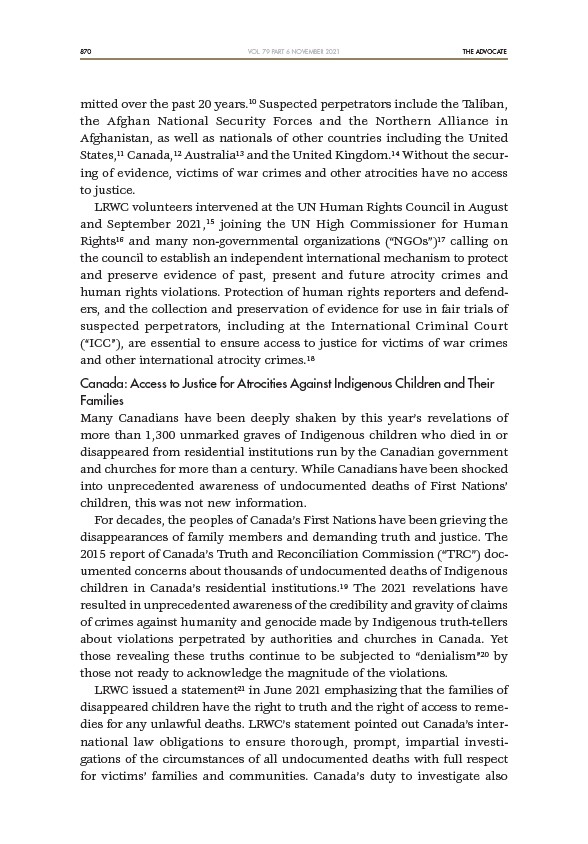
870 THE ADVOCATE
VOL. 79 PART 6 NOVEMBER 2021
mitted over the past 20 years.10 Suspected perpetrators include the Taliban,
the Afghan National Security Forces and the Northern Alliance in
Afghanistan, as well as nationals of other countries including the United
States,11 Canada,12 Australia13 and the United Kingdom.14 Without the securing
of evidence, victims of war crimes and other atrocities have no access
to justice.
LRWC volunteers intervened at the UN Human Rights Council in August
and September 2021,15 joining the UN High Commissioner for Human
Rights16 and many non-governmental organizations (“NGOs”)17 calling on
the council to establish an independent international mechanism to protect
and preserve evidence of past, present and future atrocity crimes and
human rights violations. Protection of human rights reporters and defenders,
and the collection and preservation of evidence for use in fair trials of
suspected perpetrators, including at the International Criminal Court
(“ICC”), are essential to ensure access to justice for victims of war crimes
and other international atrocity crimes.18
Canada: Access to Justice for Atrocities Against Indigenous Children and Their
Families
Many Canadians have been deeply shaken by this year’s revelations of
more than 1,300 unmarked graves of Indigenous children who died in or
disappeared from residential institutions run by the Canadian government
and churches for more than a century. While Canadians have been shocked
into unprecedented awareness of undocumented deaths of First Nations’
children, this was not new information.
For decades, the peoples of Canada’s First Nations have been grieving the
disappearances of family members and demanding truth and justice. The
2015 report of Canada’s Truth and Reconciliation Commission (“TRC”) documented
concerns about thousands of undocumented deaths of Indigenous
children in Canada’s residential institutions.19 The 2021 revelations have
resulted in unprecedented awareness of the credibility and gravity of claims
of crimes against humanity and genocide made by Indigenous truth-tellers
about violations perpetrated by authorities and churches in Canada. Yet
those revealing these truths continue to be subjected to “denialism”20 by
those not ready to acknowledge the magnitude of the violations.
LRWC issued a statement21 in June 2021 emphasizing that the families of
disappeared children have the right to truth and the right of access to remedies
for any unlawful deaths. LRWC’s statement pointed out Canada’s international
law obligations to ensure thorough, prompt, impartial investi-
gations of the circumstances of all undocumented deaths with full respect
for victims’ families and communities. Canada’s duty to investigate also